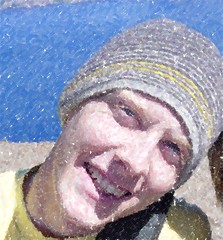What's Up Doc?

I caught this story Sunday morning on CBS This Morning. It seems as if the loveable Bugs Bunny (and 5 other Looney Tunes) will transform once again only this time he will become an edgy, futuristic crime fighter named Buzz. Not only will Buzz look drastically different from what we all grew up on, the new bunny contains superpowers such as laser vision and martial arts expertise. I am not able to find a picture of the new Bugs yet but I'm sure he's out there somewhere ready to pounce on any nasayers that disapprove of the change.
For me, I thought the new Bugs looks a tad scary. But maybe I don't want to submit to change just yet. After hearing of the news, I found a short essay by John O'Keefe over at Ginkworld. He addresses the similarities of the transitioning hare to the church. I agree with him that change is needed but should it be because we need to meet people's needs? I once heard that Willow Creek, in its embryonic stages, sent out surveys in their community and asked people what they desired "church" to be. I don't know if this is true, but it seems as if this approach is just creating a safe environment for people to gather and join a social club per say, and we have too much of that as of now going on. (I'm not dissing W.C. but one must proceed with caution in "meeting needs") No matter how much outward change takes place within the walls of a church, authenticity and reconciliation can't be checked off on any survey or written in any mission statement. These are the seeds a community will more or less cultivate over time.
Meeting people's (pre-Christian pilgrims) needs is a way to serve the community at large, but shouldn't be our main goal (I believe this is what O'Keefe is getting at). Love is. Loving those outside the church is what must happen, and again, this isn't an easily bulleted point to mark off the 6 simple steps to church growth. No, this inclusive love goes beyond races, sexual orientation, social classes, family background, occupations, neighborhood residence, and physical handicaps. We are called be God's healing hands in seeking and supplying reconciliation to our neighbors wherever they reside. Yes, meeting needs will happen through this, but change in an church must first ask herself, "Who does God desire us to be in our context?"





<< Home